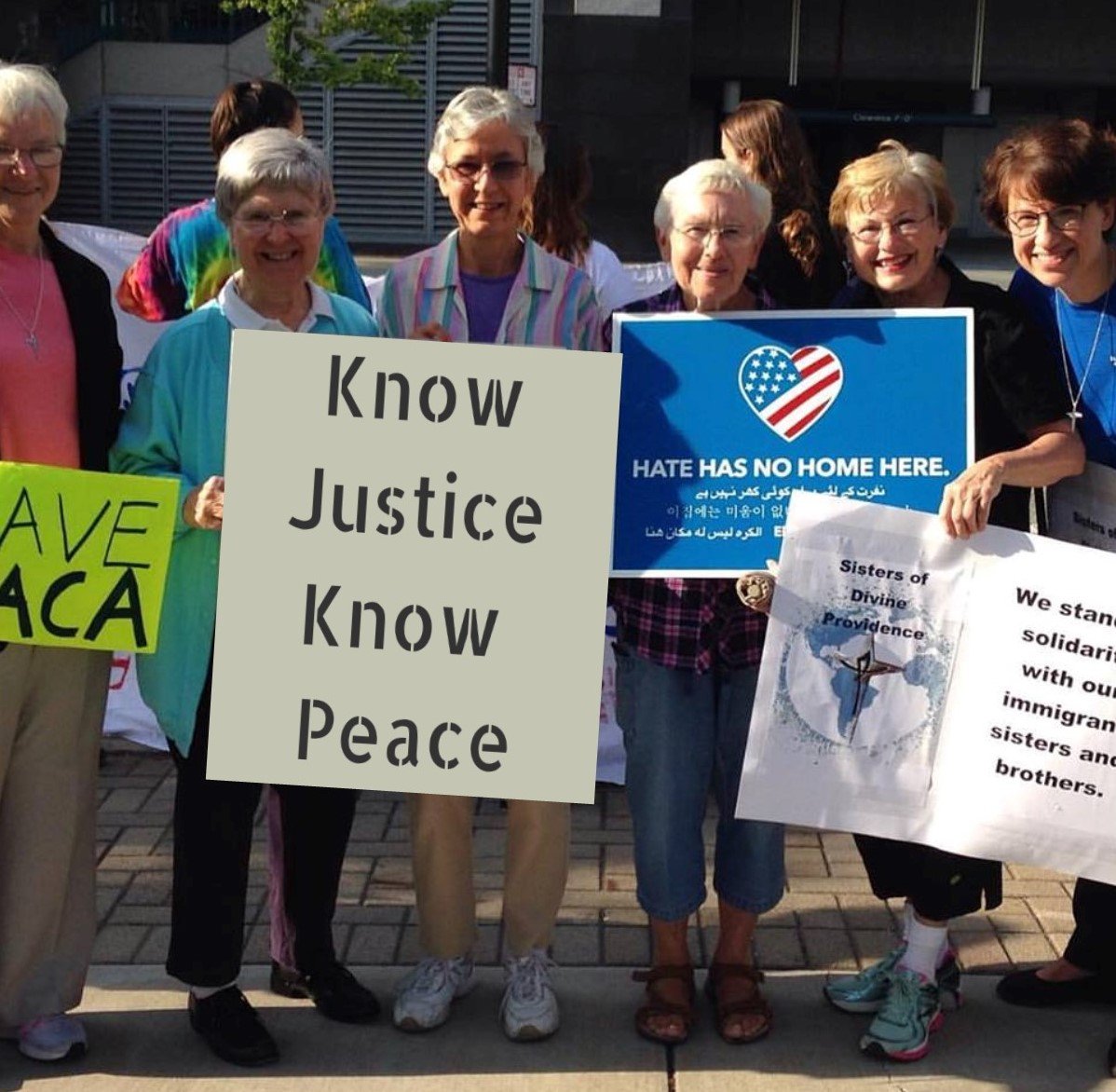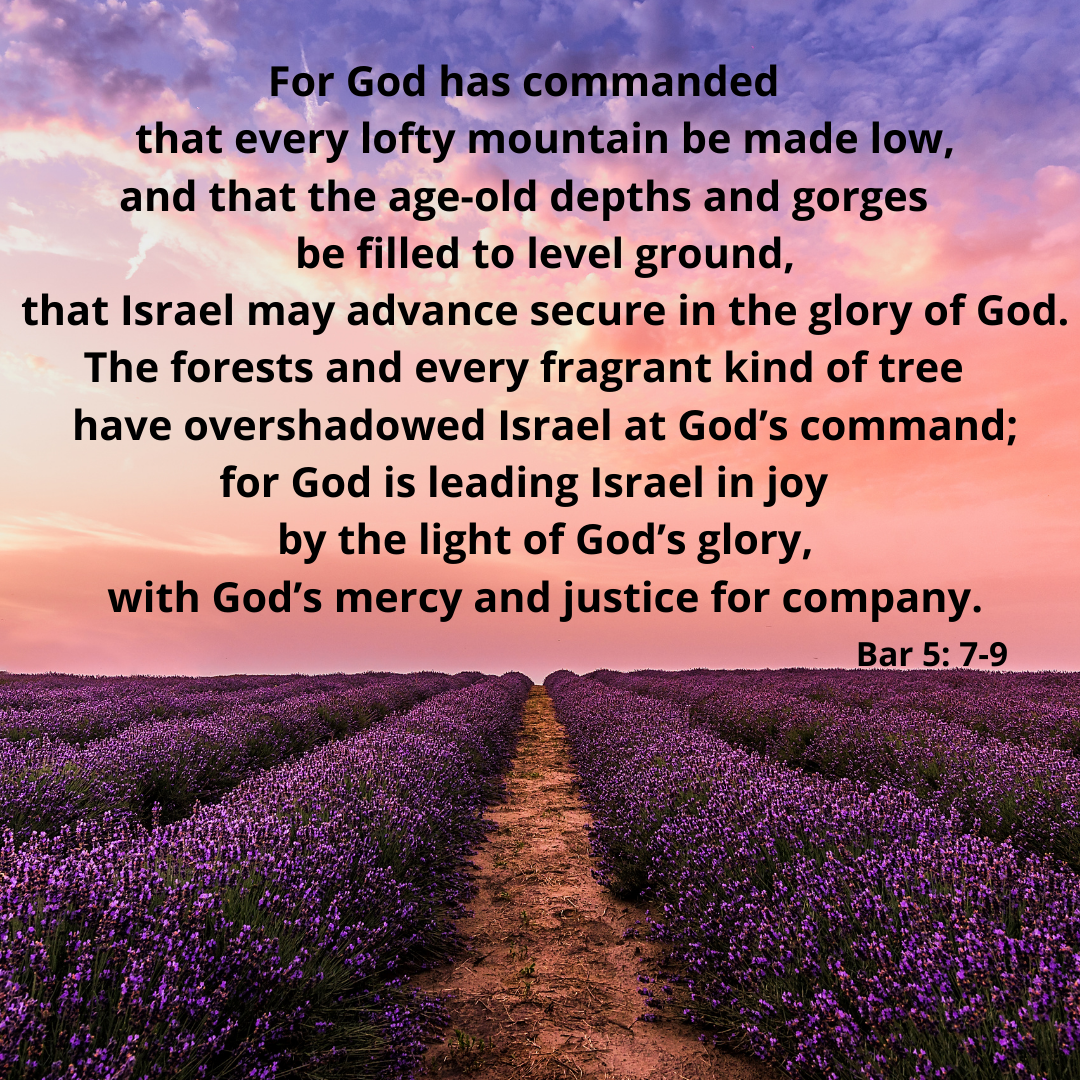The Peace of Justice
/Our First Reading from Baruch gives us a vivid image of people clothing themselves with God’s goodness and glory as they celebrate the return of those who have been scattered. People are gathered from the east and west and brought home by God, carried in like royalty. God even reengineers the landscape to make for easy passage. For a people who have been oppressed and forced into separation from each other, for people for whom travel was difficult, particularly over a rough terrain, these images must have spoken deeply to them. This theme of returning from exile is an important one for the Israelites. If you spend any time reading the Hebrew Scriptures, all through the various genres and collections of stories and books, you’ll notice elements of this theme of exile and longing for return. Because this separation was such a deep wound, we can see that the return from exile was a glorious thing to envision and something that gave people hope.
Our context today may not be quite the same. Some countries of the world do have tyranny, but most people don’t experience such outright warfare. However, we do have plenty of our own oppression and injustice, and we’re experiencing our own collective trauma. The pandemic has driven some into a kind of exile and has separated many of us. I see evidence of our exile being restored as we reemerge and gather again, but it’s not the same, is it? We’re still dealing with the effects of this ordeal and grappling with how to safely reconnect with each other. There’s a long road to healing the emotional wounds as well as the physical ones. However, God promises to be with us, to guide us, to make the way easier. God promises to gather all the people together. I hear this and take hope from it.
Baruch’s vision is not just about returning; it also speaks to an end to the oppression that separated people in the first place. A phrase that jumps out to me is “the peace of justice.” I don’t remember ever having heard it phrased quite that way, but now that I think about it, there is a real peace that comes with justice. There’s that phrase that social justice advocates have used for many years: “No justice, no peace; know justice, know peace.” I see how these are pieces of one whole. Once there’s justice for all people, a natural peace will follow, but a seeming peace without justice is not real. There might be a quietness about it, but underneath it is still oppression. When some are living out of privilege – white privilege, straight privilege, financial privilege, able-bodied privilege, or the many ways some people have advantage over others – it may feel peaceful, but it’s actually just intentional blindness. Until people with privilege see and acknowledge other people’s struggles, they’re living in ignorance, not peace. Once we know about injustice, our peace should be disrupted. We should feel a tweaking in our conscience. Most of us have some kinds of privilege and some element of disadvantage – most of us have a mix of both – and it’s helpful to name those for ourselves. We allow the ways we’ve been excluded to heighten our compassion, and we leverage our privilege to advocate for people. When everyone has justice, we all know peace.
Our prophet’s vision is not a false peace but a genuine end to the oppression that held people captive, a real gathering of community, and a life of peace and justice together. God, what a beautiful vision. Many of us long for this in our day. Many have been longing for this for many years only to see incremental movements, steps backward, and then a persistent moving forward again. As Baruch describes it, God is the one taking action, leading the people who are accompanied by God’s mercy and justice. I’m guessing that people are involved in bringing about peace too. God doesn’t usually work through magic; God works through people. Those of us who long for the peace of justice are likely called to work for it. How can we make the way easier for each other? I can’t change a physical landscape, but maybe there’s something I can do to remove barriers for people who have a harder way to go than I do. And I hope that those who have it easier than I do work to make the way easier for me. The peace of justice is hard won. Even so, I believe it’s possible. I believe it’s possible because it doesn’t just depend on us. God is leading us too. We too have God’s mercy and justice for company.
Maybe this vision of the Prophet Baruch seems utopic, or maybe it seems like something beautiful but out of reach. Maybe so, but let’s keep reaching anyway. God often calls us to do hard things, but God doesn’t call us to do the impossible. In fact, God often makes the way possible.
For Reflection:
How have you experienced the pain of separation, particularly over these pandemic years? How have you experience exclusion?
As you think about your community, your neighborhood, your country, who is exiled from the advantages that you have? Who is in great need? Where is there injustice in your community?
How can you make the way easier for someone else?
If you liked this reflection, sign up for our newsletter and receive a reflection every week, along with a podcast and reminders about events. :)
by Sister Leslie Keener, CDP
Sister Leslie Keener, CDP is the director of God Space, a community-building spirituality ministry in Cincinnati and Northern Kentucky. She’s a Sister of Divine Providence with a Masters in Ministry and a Certificate in Spiritual Direction and Retreats from Creighton University. She directs retreats, meets with people for spiritual direction, and serves as the vocation director for her community. She also serves on the Coordinating Council of Spiritual Directors International. She enjoys music, dancing, meaningful conversations, and spicy food.



